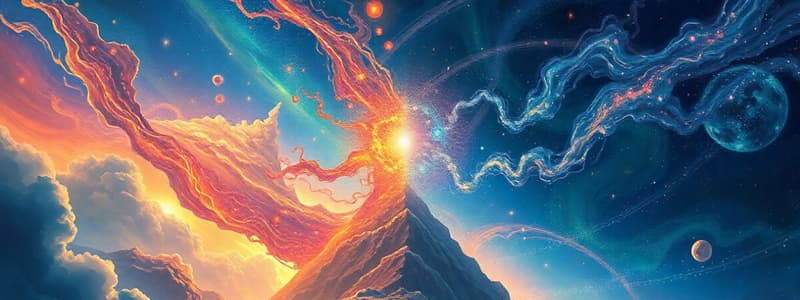Podcast
Questions and Answers
According to determinism, what is the relationship between the present and the future?
According to determinism, what is the relationship between the present and the future?
- The present and future are independent of each other.
- The present only influences, but does not determine, the future.
- The future consists of ambiguous possibilities.
- The future is already fixed and determined by the present. (correct)
What is a core tenet of indeterminism?
What is a core tenet of indeterminism?
- The future is entirely predictable.
- Possibilities can exceed actualities. (correct)
- All events are predetermined.
- Chance is an illusion.
Determinism views unrealized possibilities as what?
Determinism views unrealized possibilities as what?
- Alternative truths.
- Pure illusions. (correct)
- Sources of regret.
- Potential realities.
The dispute between determinism and indeterminism primarily concerns what?
The dispute between determinism and indeterminism primarily concerns what?
What is the role of science in resolving the dispute between determinism and indeterminism?
What is the role of science in resolving the dispute between determinism and indeterminism?
What is meant by the term 'chance'?
What is meant by the term 'chance'?
What does the author suggest about the implications of chance?
What does the author suggest about the implications of chance?
What does determinism imply regarding regret?
What does determinism imply regarding regret?
What does the author suggest is the only deterministic escape from pessimism?
What does the author suggest is the only deterministic escape from pessimism?
What logical predicament arises from determinism regarding judgments of regret?
What logical predicament arises from determinism regarding judgments of regret?
What does indeterminism corroborate?
What does indeterminism corroborate?
What phrase, according to the text, rightfully belongs to the 'cloud of sheer deceptions' our minds escort this mass of actuality withal?
What phrase, according to the text, rightfully belongs to the 'cloud of sheer deceptions' our minds escort this mass of actuality withal?
What does the author mean when they say the question of free will is 'insoluble' from a 'strict theoretical point of view'?
What does the author mean when they say the question of free will is 'insoluble' from a 'strict theoretical point of view'?
What is the significance of the Brockton murder case in the context of the discussion?
What is the significance of the Brockton murder case in the context of the discussion?
What is the core problem with seeking objective testimony to resolve whether determinism or indeterminism is true?
What is the core problem with seeking objective testimony to resolve whether determinism or indeterminism is true?
The author uses the example of choosing between Divinity Avenue and Oxford street to illustrate:
The author uses the example of choosing between Divinity Avenue and Oxford street to illustrate:
Determinism entails that the universe is a place in which:
Determinism entails that the universe is a place in which:
Which question captures the core of the debate between determinists and indeterminists?
Which question captures the core of the debate between determinists and indeterminists?
The text primarily explores:
The text primarily explores:
Why does the author bring up the concept of 'chance'?
Why does the author bring up the concept of 'chance'?
Which statement best characterizes the role of 'faith' in the debate, according to the text?
Which statement best characterizes the role of 'faith' in the debate, according to the text?
The phrase 'science professes to draw no conclusions but such as are based on matters of fact' refers to what?
The phrase 'science professes to draw no conclusions but such as are based on matters of fact' refers to what?
The Voltaire character in 'Candide' is used to present:
The Voltaire character in 'Candide' is used to present:
According to determinism, could the Brockton Murder have happened any differently?
According to determinism, could the Brockton Murder have happened any differently?
What is the 'logical predicament' in deterministic pessimism?
What is the 'logical predicament' in deterministic pessimism?
What does the phrase 'quoad existentiam' refer to regarding the devil?
What does the phrase 'quoad existentiam' refer to regarding the devil?
A person who cannot stop feeling regret when watching a sad movie is making which kind of judgment?
A person who cannot stop feeling regret when watching a sad movie is making which kind of judgment?
A deterministic optimist embraces:
A deterministic optimist embraces:
What does determinism profess about the universe?
What does determinism profess about the universe?
What, according to indeterminism, do the parts of the universe have?
What, according to indeterminism, do the parts of the universe have?
According to determinism, possibilities that fail to get realized are:
According to determinism, possibilities that fail to get realized are:
What does determinism deny?
What does determinism deny?
How does determinism view the universe?
How does determinism view the universe?
What sentiment is the stronghold of the deterministic sentiment?
What sentiment is the stronghold of the deterministic sentiment?
What does the author emphasize about the implications of determinism?
What does the author emphasize about the implications of determinism?
Which statement best summarizes the relationship between determinism and regret, according to this text?
Which statement best summarizes the relationship between determinism and regret, according to this text?
Flashcards
What is Determinism?
What is Determinism?
Parts of the universe appoint what other parts shall be; fixed from eternity.
What is Indeterminism?
What is Indeterminism?
Parts have loose play, laying down of one part does not determine others.
Determinism says what about alternatives?
Determinism says what about alternatives?
Alternatives our minds use may be sheer deceptions.
Relating to Possibilities
Relating to Possibilities
Signup and view all the flashcards
What encapsulates 'chance'?
What encapsulates 'chance'?
Signup and view all the flashcards
What does 'chance' mean?
What does 'chance' mean?
Signup and view all the flashcards
Walking Home Example
Walking Home Example
Signup and view all the flashcards
What does 'chance' imply about control?
What does 'chance' imply about control?
Signup and view all the flashcards
World Implications
World Implications
Signup and view all the flashcards
Determinism defines the universe as what?
Determinism defines the universe as what?
Signup and view all the flashcards
Determinism's Other Words
Determinism's Other Words
Signup and view all the flashcards
Deterministic escape from pessimism
Deterministic escape from pessimism
Signup and view all the flashcards
Study Notes
- The text discusses the dispute between determinism and indeterminism and how they relate to judgments of regret.
Determinism
- Determinism posits that the universe's parts are fixed, dictating the future without ambiguity.
- The present determines a single, inevitable future.
- The entire universe is interconnected, leaving no room for alternatives.
Indeterminism
- Indeterminism suggests parts of the universe have some "loose play," allowing for multiple possibilities.
- It allows for possibilities that may become impossible only when another possibility becomes real.
- Indeterminism supports pluralism, aligning with the common view that actualities are chosen from a wider range of possibilities.
Determinism vs. Indeterminism
- Determinism believes possibilities exist nowhere, with necessity and impossibility as the only real categories.
- Unrealized possibilities are illusions, as everything was virtually present from eternity.
- The core issue is about the existence of possibilities that may or may not occur.
- Indeterminists believe alternative volitions could occur, while determinists believe only one outcome is possible.
The Role of Facts
- Facts have little influence on whether one is a determinist or indeterminist.
- Both sides use facts to support their views, but their interpretations are subjective.
- Whether considering the predictability of human conduct or the anxiety of life, both sides can find support for their views.
- The division between possibility men and anti-possibility men is due to different faiths or postulates of rationality.
- Preference for determinism stems from antipathy towards the idea of chance.
Chance
- The notion of alternative possibilities are often considered "chance," which is deemed intolerable by determinists.
- Chance is seen as irrational, a threat to intelligibility and law.
- It is feared that even a small amount of chance could lead to chaos.
- Chance is not positive; it is negative and relative, meaning it is disconnected from prior control or necessity.
- Chance does not describe the intrinsic nature of a thing but that its occurrence is not guaranteed by the system.
- The origin of chance is negative; it escapes control and comes as a free gift.
Implications on the Universe
- Some view any disconnect or ambiguity as potentially ruining the universe.
- The question arises whether the independent and accidental character of future human volitions could lead to such consequences.
- The text considers choosing between walking on Divinity Avenue or Oxford Street.
- It posits making the choice twice, each time choosing a different street, and creating two alternative universes.
- Determinists would argue that one of these universes was impossible from eternity due to intrinsic irrationality.
- However, it is difficult to identify which universe is impossible based on outward observation.
Meaning of the Concepts
- Determinism means that no part of the world can absolutely control the destinies of the whole.
- The text has not yet argued for the real existence of chance, only that it seems that way.
- The question of whether the world is one of chance or not is theoretically insoluble.
- The aim is to deepen the understanding of the difference between a world with chances and a deterministic world.
Implications of a Deterministic World
- A deterministic world implies constant judgments of regret.
- People often wish things could be otherwise, even from their limited perspective.
- Regrets can be hard to stifle, especially for acts of cruelty or treachery.
- An example given is the Brockton murder, where the perpetrator's actions and lack of remorse are disturbing.
- From the perspective of determinism, the murder was necessary from eternity, and no alternative was possible.
Deterministic Philosophy Implications
- Admitting alternatives would be a "suicide of reason," necessitating acceptance of the murder.
- The question arises about the nature of the universe if the Brockton murder was predetermined.
- Persisting in judgments of regret implies a pessimistic view; regretting the murder means believing the universe would be better without it.
- Determinism, by denying alternatives, defines the universe as one in which what should be is impossible.
- This is akin to viewing the universe as an organism with an incurable flaw.
Escaping Pessimism
- The deterministic escape from pessimism involves abandoning judgments of regret.
- The devil (evil) may be necessary for a better universe overall.
- Evil can be a condition for a higher form of good.
- Generalizing this view suggests that even events like the Brockton murder have a purpose in the larger scheme of things.
- This aligns with an optimism quand meme, a systematic optimism exemplified by characters in Voltaire's Candide.
- Such optimism can be seen as a grace in religious figures, marked by hope and tenderness.
Consequences of Abandoning Regret
- Cruelty and treachery may even be considered blessings.
- Only a pessimistic soul that gives way to regret, remorse, and grief is seen as blasphemous.
- Deterministic pessimism can turn into deterministic optimism by relinquishing judgments of regret.
- Calling judgments of regret wrong leads to a logical problem, and questions the validity of these judgements.
- If judgments of regret are wrong, judgments of approval should take their place.
- Since everything is necessitated, nothing can change, leaving the universe as a place where what should be seems impossible.
- Actions are freed from evil, but judgments are stuck.
- When negative acts cease to be sins, regrets become absurdities.
- Active and theoretical life enter a seesaw balance on the ground of evil.
Studying That Suits You
Use AI to generate personalized quizzes and flashcards to suit your learning preferences.




